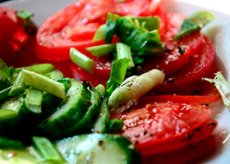
All iLive content is medically reviewed or fact checked to ensure as much factual accuracy as possible.
We have strict sourcing guidelines and only link to reputable media sites, academic research institutions and, whenever possible, medically peer reviewed studies. Note that the numbers in parentheses ([1], [2], etc.) are clickable links to these studies.
If you feel that any of our content is inaccurate, out-of-date, or otherwise questionable, please select it and press Ctrl + Enter.
What can and cannot be done for gout?
Medical expert of the article
Last reviewed: 04.07.2025

Gout, which occurs due to the accumulation of urate crystals in joints and other tissues, is the result of systemic disturbances in the catabolism of nitrogen-containing purine bases of nucleic acids. Those diagnosed with this disease should know what is allowed and what is not allowed with gout.
First of all, this concerns foods, the consumption of which either promotes or counteracts hyperuricemia – an excessive amount of uric acid in the blood, which is formed during the breakdown of purines.
Read also: Diet for gout
When determining whether certain foods can be eaten with gout, and what foods should never be eaten with gout (for example, red meat, organ meats, and fatty fish), it should be borne in mind that the precipitation of uric acid crystals is facilitated by a shift in the acid-base balance of the body to the acidic side.
Alkaline products containing organic acids help combat the decrease in pH of the blood and all physiological fluids. According to experts from the American National Institute of Health (NIH), a more alkaline internal environment is the most important biochemical condition for leveling the properties of uric acid (C 5 H 4 N 4 O 3 ), which is weak but poorly soluble in most fluids and is present in the blood as monosodium salt. In addition, organic acids help reduce the synthesis of uric acid by the kidneys.
Another important point is the presence of sodium salts of uric acid or calcium salts of oxalic acid in the urine, i.e. urates or oxalates. This pathology is a frequent companion of metabolic problems, and this imposes additional restrictions on certain products.
So, what foods can and cannot be consumed for gout?

